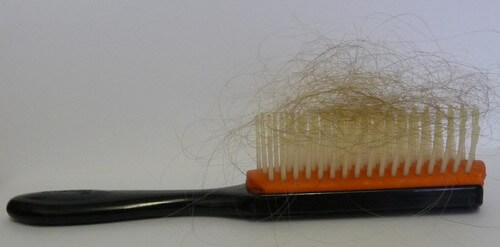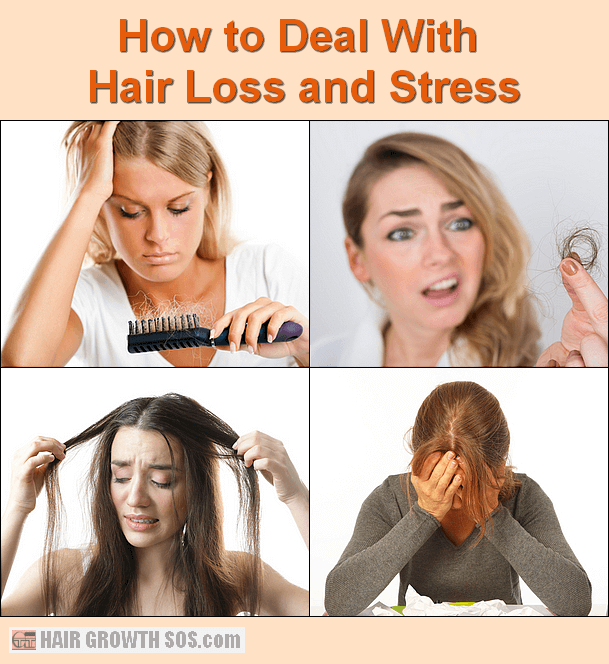- Home
- Causes of Hair Loss
- Fibromyalgia
Fibromyalgia Hair Loss: What Causes it? And How Do You Treat It?
By Paul Taylor
Hair loss is just one of many symptoms fibromyalgia can cause.
This disorder has been estimated to affect between 2% to 4% of the general population, and up to 90% of cases are women (1).
Not all those who suffer from fibromyalgia will develop hair loss. Nevertheless, this article gives an overview of this condition (cause, symptoms, treatment) specifically in relation to hair loss.
Cause
A definitive reason for fibromyalgia is not known. However, some experts believe its cause could be due to any of the following:
1. Genetics.
2. Psychosomatics (i.e., "it's all in the mind").
3. Disruption in parts of the brain (e.g., the hippocampus).
4. Interference in the normal functioning of substances such as dopamine and serotonin.
5. Many other theories have been put forward too, including high stress levels caused by anxiety at home or at work, depression, etc.
Fibromyalgia
has also been linked to Hashimoto's thyroiditis (an autoimmune disease
that causes inflammation of the thyroid gland) and chronic fatigue
syndrome (which causes long-term, debilitating tiredness).
Symptoms
From the two lists below, you can see that there are many possible symptoms which can be physical (occuring in various areas of the body) or mental (1).
Physical symptoms
These include:
- Headache, fever, hearing problems, dry eyes.
- Skin rashes, hair loss.
- Digestive disorders: diarrhea, constipation, IBS (Irritable bowel syndrome).
- Painful urination.
Mental symptoms
Since fibromyalgia is often considered to be a mental disorder, other symptoms might be regarded as being more related to brain function:
- Insomnia.
- Depression.
- Fatigue.
- Stress and anxiety.
However, upon examination for physical injuries, and blood tests to rule out other disorders, there can quite often be no obvious symptoms detected.
Is hair loss the worst fibromyalgia symptom?

Hair loss caused by fibromyalgia is arguably one of the worst of its many symptoms. That's because rapid, heavy hair shedding is something that can put a lot of people into a state of shock.
Finding a mass of hair on your pillow, in your brush, or in the sink whenever you wash your hair, can be extremely distressing, especially if it's unrelenting, day after day.
Eventually, you might look in the mirror and see a noticeable decrease in the volume of your hair: thin, lackluster and fragile, capable of falling out simply by touching it, or so it seems.
All of which can obviously increase your stress levels, something that's not exactly going to help you overcome fibromyalgia.
And, since hair loss can be stress-related, a vicious-circle could then easily develop.
So, given the connection fibromyalgia has to stress, anxiety and depression, it's easy to see how any hair loss and related stress it causes, could be considered the worst symptom.
Note: Any
fibromyalgia-related hair loss you do experience is supposed to be just
temporary. So, when (or if) your fibromyalgia disappears, the hair loss it
causes should disappear too.
Treatment
Since the actual cause of fibromyalgia is not known, there is no cure. Obviously it's very difficult to cure something if you don't know what's causing it.
But conventional treatment includes:
- Deep tissue massage
- Heat
- Ultrasound
- Exercise
And painkillers, antidepressants, anti-inflammatories, etc. might also be prescribed by a doctor.
As for treating the fibromyalgia hair loss directly, my own techniques
were designed for androgenetic alopecia, but three of them can also be
used with other types of hair loss.
Here’s a testimonial from a lady who tried my techniques:
"Hello! This is Rose. I have received the ebook and I'm using the techniques. My attitude changed from the first day I started. Knowing I'm doing something for my scalp alongside the techniques has helped me stop worrying about my hair."
Mrs R. Callaghan, UK
These three techniques massage the scalp. They're very easy to do and quite repetitive, making them somewhat meditative as well. So there's a good chance they would help take your mind off fibromyalgia and stress levels for a while, as well as hopefully restoring healthy hair growth sooner than you otherwise would if you took no action at all.
I believe being proactive is the best way to tackle a problem, both for the physical effects it can have, as well as the positive mindset it will bring.
And if you can successfully treat your
fibromyalgia-related hair loss, perhaps many of the other symptoms it causes
might then disappear too.
|
Like this page? |
|


